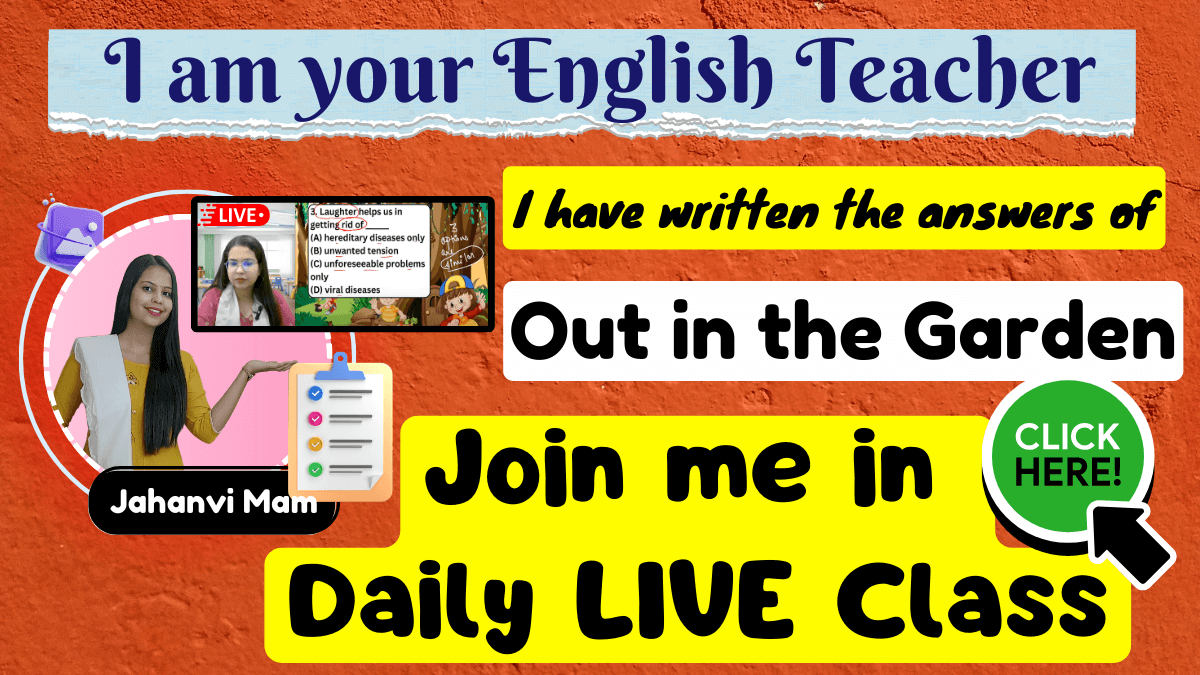Out in the Garden - Class 3 English NCERT Solution
Out in the Garden from Class 3 English NCERT captures the joy of playing outside, whether it’s bouncing a ball, flying a kite, or playing with friends. This poem encourages children to enjoy outdoor activities and appreciate nature. Along with the poem, this page includes vocabulary lists, extra questions, and comprehensive solutions to enhance students’ understanding and engagement with the poem’s playful spirit.
Word Meanings
| Sl | English Word | Hindi Meaning | English Meaning |
|---|---|---|---|
| 1 | Bounce | उछालना | To move quickly up or away from a surface after hitting it |
| 2 | Throw | फेंकना | To propel something with force through the air by a movement of the arm and hand |
| 3 | Catch | पकड़ना | To intercept and hold (something that has been thrown, propelled, or dropped) |
| 4 | Tug | खींचना | To pull (something) hard or suddenly |
| 5 | Pull | खींचना | To exert force on (someone or something) so as to cause movement towards oneself |
| 6 | Skip | कूदना | To move along quickly with a series of light steps, with alternate feet off the ground |
| 7 | Sway | झूलना | To move or cause to move slowly or rhythmically backward and forward or from side to side |
| 8 | Slide | फिसलना | To move smoothly along a surface while maintaining continuous contact with it |
| 9 | Swing | झूलना | To move or cause to move back and forth or from side to side while suspended or on an axis |
| 10 | Kite | पतंग | A light frame covered with thin material, flown in the wind at the end of a long string |
A. Answer the following.
1. What are the children doing with the ball?
According to the poem, the children are bouncing, throwing, and catching the ball.
2. How are children playing with the kite?
The children are tugging, pulling, and flying the kite.
3. Where are the children playing?
The children are playing out in the garden.
B. Think and answer.
1. Where do you play?
This is a personal question for students to answer based on their own experiences. They might play in a garden, playground, park, or at home.
2. What games do you play outside?
Students can mention various outdoor games they play, such as cricket, football, hide and seek, or any local games.
3. What happens if we are not careful while playing outside?
If we're not careful while playing outside, we might get hurt, fall down, or injure ourselves. We might also damage our toys or disturb plants and animals in the garden.
Look at some more games. Do you know them? Have you played them? What do you call them in your mother tongue?
This section asks students to identify and discuss various games shown in pictures. They should share the names of these games in their mother tongue and talk about their experiences playing them.
Combining words using 'and'
Combine these words using 'and' and write them in the blanks. One has been done for you.
1. give, take = give and take
2. sing, dance = sing and dance
3. eat, drink = eat and drink
4. catch, throw = catch and throw
5. run, catch = run and catch
Can you think of two more word pairs? Write them here.
Students should come up with their own word pairs. Examples could be: - jump and hop - read and write - laugh and smile
Paper Bag Puppet
This section provides step-by-step instructions for making a paper bag puppet. The materials required are paper bags, a pencil, colour pencils or sketch pens, woollen threads, and gum.
Process:
1. Take a used paper bag with a base.
2. Fold the base upward.
3. Hold it upside down with the handle downwards.
4. Draw the upper lip on the line of the flap of the base.
5. Draw the lower lip right below the upper lip.
6. Then draw the face and colour it. Decorate it.
7. Slide your hand into the bag.
8. Bend your fingers inside the bag.
9. Now, you can make your puppet talk.
Additional Short Answer Questions
1. What does the poem say about the weather when the children are playing?
The poem mentions that the children play "on each fine day," suggesting that the weather is good and pleasant for outdoor activities.
2. How many different activities are mentioned in the poem?
The poem mentions three main activities: playing with a ball, flying a kite, and playing with friends (which includes running, skipping, jumping, swaying, sliding, and swinging).
3. Why do you think the children enjoy playing in the garden?
Children might enjoy playing in the garden because it's an open space where they can run freely, enjoy fresh air and nature, and have room for various activities like ball games and kite flying.
4. What are some benefits of playing outdoors?
Benefits of playing outdoors include getting fresh air and sunshine, physical exercise, developing motor skills, socializing with friends, and connecting with nature.
5. How does the poem create a rhythm?
The poem creates rhythm through repetition of phrases like "Out in the garden, Each fine day" and by using rhyming words at the end of lines.
6. What skills can children develop by playing the games mentioned in the poem?
Children can develop skills like hand-eye coordination (ball games, kite flying), balance (running, skipping), teamwork (playing with friends), and physical fitness (all activities mentioned).
7. Why is it important to have a variety of games and activities?
Having a variety of games and activities is important because it helps develop different skills, keeps play interesting and fun, and allows children to find activities they enjoy and excel at.
8. How can making a paper bag puppet help in a child's development?
Making a paper bag puppet can help develop fine motor skills, creativity, imagination, and storytelling abilities. It also provides an opportunity for craft-making and self-expression.
9. What safety precautions should children take while playing outdoors?
Safety precautions for outdoor play include being aware of surroundings, not talking to strangers, wearing appropriate clothing and shoes, using sunscreen, staying hydrated, and following rules for equipment use.
10. How does playing with friends differ from playing alone?
Playing with friends allows for social interaction, teamwork, and learning to share and cooperate. It can be more dynamic and unpredictable compared to playing alone, which might allow for more personal creativity and self-directed play.
The Speedy Brains APP Download
Over 15000 students from all over India rely on our The Speedy Brains App for their School Exams. 850 Satisfied students have given 5 star review to our Android app on Google Play Store.
- Best Online LIVE Class APP
- Live Class Recordings
- Unlimited Practice Tests
- Previous Year Questions
- 800+ 5star Ratings

